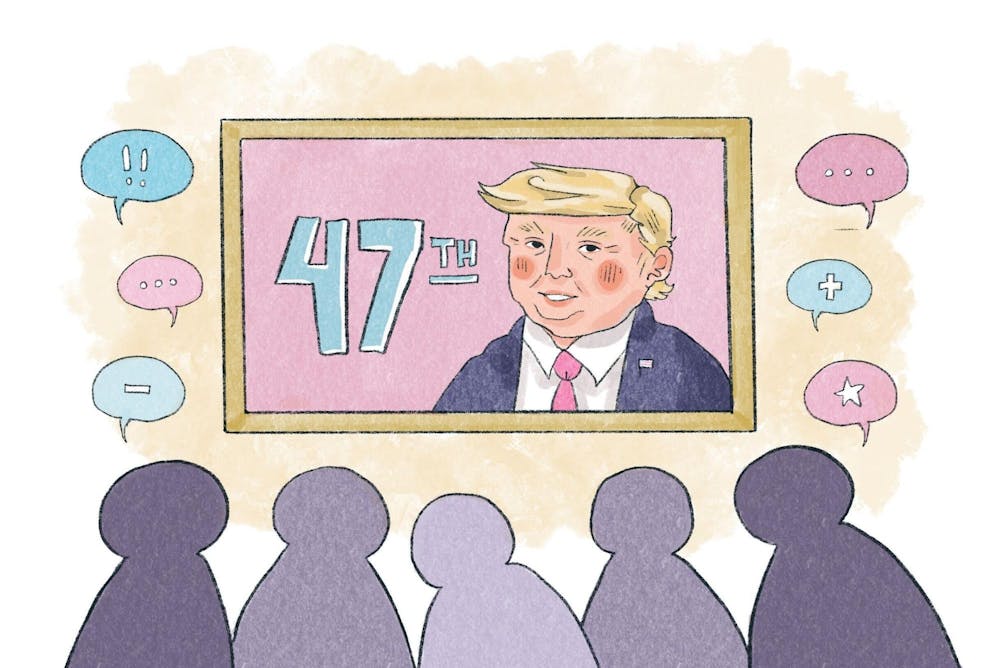After U.S. President-elect Donald Trump’s historic political comeback, several Emory University political science professors discussed his electoral victory as well as the contributing factors of an election that was predicted to be “too close to call.”
Trump won 312 electoral votes, well above the 270 required to secure the presidency, and swept all seven swing states. Associate Professor of Political Science Zachary Peskowitz told The Emory Wheel the result was unsurprising since the election was considered a tossup in most pre-election polling.
“It wasn’t by any means a shocking outcome,” Peskowitz said. “A lot of the sophisticated analysts said there was a decent chance that one candidate would win the preponderance of the battleground states.”
Associate Professor of Political Science Andra Gillespie spoke about the decisiveness of Trump’s victory, particularly with his wins in perceived blue states and in the popular vote — the first time a Republican has won the popular vote in 20 years. She noted how the election ended up quite close, with Trump winning key states by margins of around 100,000 to 200,000 votes per state, but the president-elect still made a notable movement.
“What was decisive was that he won the popular vote,” Gillespie said. “What was also decisive was that the margins were actually narrower in states that weren’t particularly competitive. So in particular, he did earn a larger share of the vote in Democratic states and states that were not considered highly contested.”
Gillespie noted that the results of this election should not be necessarily read as indicative of a clear electoral mandate.
“The margins by which it looks like he’s poised to beat Kamala Harris are actually narrower than the margin by which Joe Biden beat him if we’re looking at the absolute number of votes that Joe Biden got in 2020,” Gillespie said.
Gillespie and Peskowitz agreed that the economy was one of — if not the most — important factor in deciding the election. Peskowitz pointed to a broader global trend of incumbent parties losing recent elections because of record inflation.
“The inflation experience and the cost of living that increased in 2021 and 2022 were the major issues,” Peskowitz said. “Looking at these results and looking at other countries, we see that incumbent governments all over the world have done very poorly in elections in 2024, and a lot of that has to do with the relatively high inflation that we experienced in 2021 and 2022.”
Ann and Michael Hankin Distinguished Professor of Political Science Bernard Fraga referred to the election as a “referendum on Biden” and the president’s record. Both Fraga and Gillespie acknowledged that Vice President Kamala Harris inherited very difficult fundamentals by the time she entered the race, with only 107 days between her candidacy announcement and Election Day.
“We have to acknowledge that Harris was working … under really tough conditions,” Gillespie said. “We need to be careful about criticizing her for not working miracles here. The fundamentals were challenging from the outset, and Joe Biden would have likely struggled under these conditions as well, had he stayed in the race.”
In an interview with Democracy Now!, Robert W. Woodruff Professor of African American Studies Carol Anderson cited misogyny and racism as key motivating factors for Trump’s victory. She referred to the election results as a “last stand of white supremacy” and a reaction to a perceived “great replacement.”
“We’re looking at the misogyny and the racism and the fear of what it meant to have a Black Asian woman who’s married to a Jewish man sitting in the White House, that this was not the kind of vision of America that that large swath that voted for Trump believe is America,” Anderson said. “It is the fear of what a multicultural, multiracial, multilingual, diverse America could mean.”
While some political analysts, such as Anderson, have ascribed Trump's victory to Harris’ identity, others, such as TIME magazine staff writer Eric Cortellessa, attribute Trump’s win to the “resentment of disenchanted voters.” Another explanation provided by former Speaker of the House Nancy Pelosi (D-Calif.) blamed President Joe Biden for dragging his feet before dropping out after his debate performance against Trump. Despite there being no conclusive reason for Trump’s victory, Peskowitz pointed out that there are many people “pushing their preferred narrative” as the reason for the election’s outcome.
Gillespie noted that no matter the outcome, Harris inherited a tough situation.
“There will be a lot of speculation about the timing of Biden's decision to drop out of race and people will wonder now, in a counterfactual kind of way, … if he had dropped out of the race earlier, would that have made it easier for Kamala Harris or any possible successor to be able to come in and right the ship,” Gillespie said. “It's important to note here that despite her loss, Harris put a tremendous campaign together in a little over 100 days.”








